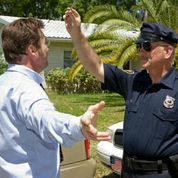The quintessential element when the prosecution is attempting to prove a DWI is whether the driver was “intoxicated” or “materially or  appreciably impaired.” Generally, this is proven by presenting the results of the breath-test in court. However, if a breath-test has not been utilized, the element can also be proven if the driver performed poorly on field-sobriety testing, or if eyewitness testimony is available.
appreciably impaired.” Generally, this is proven by presenting the results of the breath-test in court. However, if a breath-test has not been utilized, the element can also be proven if the driver performed poorly on field-sobriety testing, or if eyewitness testimony is available.
Eyewitness testimony is admissible as evidence of impairment as long as it is based on personal observations. This typically applies to police officers due to the fact that their testimony is considered to be competent, and for the most part, reliable. Lay witnesses may also be given a chance to testify; however, the testimony must be based on their personal observation. Lastly, the State may use a suspect’s refusal to submit to an intoxilyzer test as substantive evidence of guilt on a DWI charge.
This has been determined in the case of State v. Gregory, 154 N.C. App. 718 (2002), the holding determined that a driver could be found to be impaired, for the purpose of a DWI, based solely on a police officer’s testimony. In Gregory, the driver refused to submit to the intoxilyzer test, and the court used the officer’s statement that the driver changed lanes without signaling, sped up and slammed on the brakes, stopped in the center lane of traffic, had slurred speech, and glassy eyes. Further, the officer testified that the driver staggered while walking along the patrol car using the car to steady his movements.